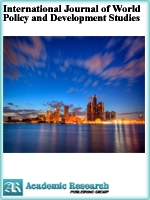International Journal of World Policy and Development Studies
Online ISSN: 2415-2331
Print ISSN: 2415-5241
Print ISSN: 2415-5241
Quarterly Published (4 Issues Per Year)

Archives
Volume 1 Number 1 December 2015
Pythagoras? Philosophy and the Growth of African Politics: A Critical Assessment
Authors: Elijah Okon John ; Matthew Joseph Akpan
Pages: 30-36
Abstract
Pythagoras, in the process of investigating the structure of the world order, addressed issues, some of which are: transmigration and immortality of the soul, conflict of opposites, tetraktys and the world like a game of festival. This research critically examines Pythagoras’ philosophy in the light of these issues and submits that, though Pythagoras’ philosophy is limited, perhaps, due to the fact that it is deeply rooted in mysticism, it contains some insights which can assist in the growth of African politics.
Blue Diplomacy of Central Asia under Pressure of the Climate Change
Authors: Ranat Rysbek kyzy
Pages: 26-29
Abstract
The article explains the nature of transboundary water management system in Central Asia and identifies the most acute deficiencies in rational use of water, which may become the potential “casus bellum” of regional conflicts and threat to water security. The article sheds light on the national interests of regional states regarding water resources. The global warming is represented in two different dimensions: as a catalyst of wars for hydro resources and as a conciliator of long- existing “hydro political” tensions in the region. Potential recommendations for peaceful and sustainable water management are also briefly stated.
The Existence of Regional Investment Regulation System Based on Decentralization
Authors: Grees Thelma Mozes
Pages: 21-25
Abstract
The act number 25, year 2007 had already been determined to spur investment growth in the region. In fact even though this law has been issued, the model of regional investment regulation still varies. Consequently investment growth of each region is not the same and it highly depends on local policies as well as local regulation on both licensing, and financing. The investment of decentralization so far has not been consistent yet; therefore, the implementation of investment in every region still varies and has an impact on uncertainty investment. The fact indicates that there are still some investment problems such as the case of MNR Company in Minahasa and the case of MSN Company. This research used formative law research method supported by field studies`. The results of the study show the model of regional investment regulation is still in dualism: the investment permit follows the model implemented by the central government with one door service, while the investment policy in the region follows the regional government in accordance with the spirit of regional autonomy. An arrangement of dualism investment impacts on investors who invest in an uncertain financing investment and security. For that reason, it is required the development of legal investment based on decentralization to accelerate the investment growth in North Sulawesi. To sum up, the dualism of the investment regulation model should be studied in a form of affirmation of macro and micro business investment in the division between the central and regional governments. To ensure the investments, the regional regulations in the field of investment protection are needed.
Estimating Technical Efficiency of Groundnut (Araches hypogaea L.) Production in New Halfa Agricultural Production Corporation, Sudan
Authors: Abdelraouf I. Yousif ; Ibrahim S. Mohamed ; Ahmed M. El Naim ; Hashim A. Elobeid ; Adam E. Ahmed
Pages: 16-20
Abstract
This research study was conducted during season 2006/07 at New Halfa Agricultural Production Corporation (an irrigated Agricultural scheme in Eastern Sudan). To evaluate the technical efficiency of groundnut production by using stochastic frontier production function. The results indicated that the mean production technical efficiency was 70%. This shows that there is a scope for increasing groundnut production by 30%, with the present level of inputs and technology. Also, the result depicted that the irrigation numbers, tenancy location, weeding, labour and farm income were the most important factors that determining production technical efficiency, whereas the extension, agricultural credit had significant effects on tenants’ technical inefficiency of groundnut production. To improve groundnut production technical efficiency, the study recommended usage of herbicides, introduce of high yield varieties, cleaning and maintenance of irrigation canals.
Foreign Capital Inflow and Domestic Private Investment in Nigeria - A Disaggregated Model
Authors: Ogbonna Innocent Chukwuka
Pages: 1-15
Abstract
Foreign capital inflow (KI) is arguably a vital source of external capital, especially for developing countries with low domestic savings rate. Investigating the trend of KI into Nigeria, we observed that as a ratio of GDP it was 0.67% in 1979, 6.88% in 1989, 9.45% in 1999, and 19.31% in 2009. Thus, this study �Foreign Capital Inflow and Domestic Private Investment in Nigeria � A Disaggregated Model� is intended to examine the relationship among aggregate KI and domestic private investment (DPI) on one hand, and disaggregated KI and DPI on the other in the period 1986Q1-2012Q4. Variables such as DPI, KI, three inflow components: (foreign direct investment (FDI), portfolio investment (PFI), and remittances (REM)) and dummy are employed. The framework of Khan (2011) which expressed DPI as a function of the explanatory variables was modified and adopted. With coefficient of -0.021 and t-statistic of -0.968 for the first model, the results reveal that aggregate KI has inverse but insignificant relationship with DPI in the short and long run. When disaggregated (second model), FDI coefficient is 0.190 with t-statistic value of 3.013 indicative that the variable has significant growth-inducing impact on DPI. The coefficients of PFI and REM are -0.017 and -0.121 with t-statistic values of -1.105 and -4.887 respectively, suggestive that both have depressing impact on DPI. The joint depressing impact of PFI and REM on DPI is greater than the expansionary impact of FDI on DPI. The coefficient of dummy was found to be significantly positive in determining DPI.


